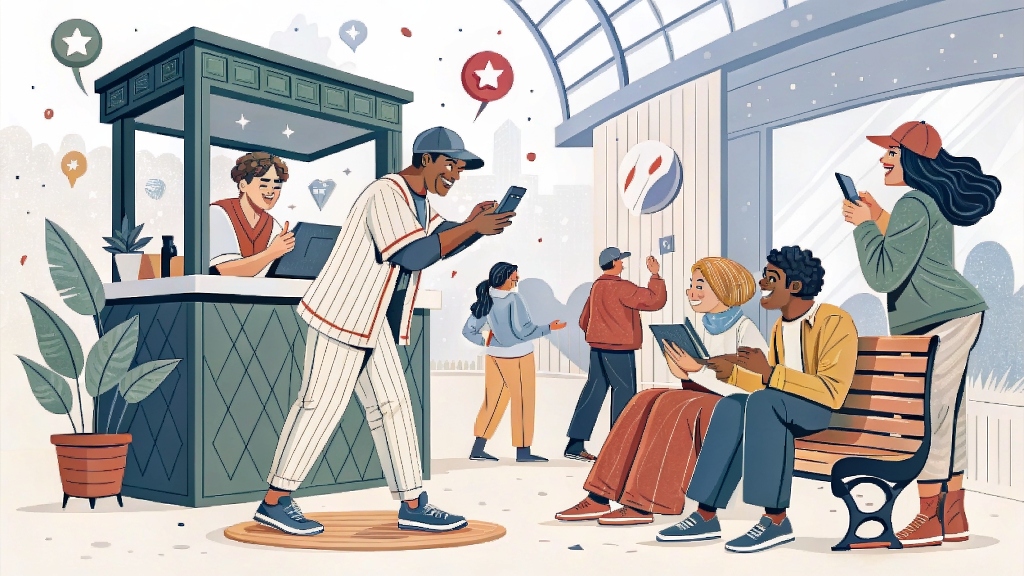
Digital Tickets, Enhanced Security, and Fan NFTs Transform Game Day Experience
Major League Baseball (MLB) is stepping up to the plate in the blockchain era, with multiple franchises partnering with blockchain technology firms to overhaul their ticketing systems. This groundbreaking initiative aims to combat fraud, streamline fan experiences, and unlock new revenue streams through digital collectibles—marking one of the most significant integrations of Web3 technology in professional sports history.
The Blockchain-Ticketing Partnership: A Home Run for Teams and Fans
Under the new partnerships, MLB teams are adopting blockchain-based ticketing platforms to replace or supplement traditional paper and mobile tickets. These systems leverage distributed ledger technology to create immutable, verifiable digital tickets stored in fans’ crypto wallets. Key features include:
- Fraud-Proof Tickets: Each ticket is minted as a non-fungible token (NFT), making counterfeiting virtually impossible.
- Dynamic Resale Markets: Fans can securely transfer or resell tickets via blockchain platforms, with teams retaining control over price ceilings to deter scalping.
- Smart Contract Automation: Terms like transfer restrictions or royalty fees for resales are programmed directly into tickets.
- Seamless Integration: Tickets sync with existing ballpark apps for quick QR code scanning at gates.
Early adopters include marquee franchises like the San Francisco Giants, New York Yankees, and Chicago Cubs, though league officials confirm the technology will be available to all 30 teams by the 2026 season.
How Blockchain Ticketing Works: From Purchase to First Pitch
The fan journey begins with purchasing a ticket through the team’s website or app. Instead of receiving a PDF or mobile pass, buyers get a unique NFT ticket stored in either a custodial wallet (managed by the team) or a self-custody wallet like MetaMask.
Key stages in the blockchain ticketing process:
- Minting: The team’s partnered blockchain platform generates an NFT ticket tied to the game’s date, seat location, and purchasing account.
- Delivery: The NFT is sent to the fan’s digital wallet, often accompanied by interactive 3D visuals of the ballpark or team logos.
- Transfer/Resale: If unable to attend, fans can transfer tickets peer-to-peer or list them on team-approved marketplaces with built-in anti-scalping safeguards.
- Entry: At the stadium, fans scan their NFT’s QR code via the team’s app or wallet interface.
- Post-Game: Tickets remain in wallets as digital memorabilia, with some unlocking exclusive content like video highlights or discount codes.
Tackling Fraud and Scalping: A New Era of Ticket Integrity
Counterfeit tickets and predatory resale practices have long plagued live sports. Blockchain’s inherent features address these issues head-on:
- Immutable Ownership Records: Every ticket transaction is permanently recorded on the blockchain, allowing teams to trace a ticket’s full history from issuer to final attendee.
- Dynamic Pricing Controls: Teams can programmatically set maximum resale prices—for example, capping markup at 20% above face value for regular season games.
- Real-Time Verification: Stadium staff instantly confirm a ticket’s validity by checking its blockchain record, reducing entry delays and fraud attempts.
The Boston Red Sox reported a 92% drop in counterfeit ticket incidents during their first season using blockchain ticketing, while the Los Angeles Dodgers saw a 40% increase in legitimate resale market activity.
Beyond Entry: NFTs and Fan Engagement
The partnerships go beyond ticketing, with teams offering NFT-based rewards to enhance fan loyalty:
- Digital Collectibles: Fans receive limited-edition NFTs for attending games, which can be traded or used to unlock perks like merchandise discounts.
- Augmented Reality (AR) Experiences: Scanning ticket NFTs in-ballpark activates AR features, such as virtual player meet-and-greets or historical game highlights.
- Rewards Programs: Season ticket holders earn “loyalty points” recorded on the blockchain, redeemable for VIP experiences or autographed memorabilia.
The Atlanta Braves pioneered this approach in 2024, distributing over 500,000 game-specific NFTs that doubled as food vouchers and raffle entries.
Economic Impact: New Revenue Streams for Teams
Blockchain ticketing isn’t just about fan convenience—it’s a financial game-changer for teams:
- Resale Royalties: Smart contracts enable teams to collect a percentage (typically 5-10%) every time a ticket is resold, creating perpetual revenue streams.
- Data Monetization: With fan consent, anonymized blockchain data can be sold to sponsors to improve targeted advertising.
- Reduced Costs: Eliminating paper tickets and third-party verification services saves teams an estimated $3-5 million annually.
The Philadelphia Phillies reported a $8.2 million revenue boost in their first year from resale royalties and NFT collectible sales.
Fan Response: Embracing the Digital Future
Early adopters praise the system’s convenience and added benefits. “I love having my ticket as an NFT—it’s like a digital souvenir,” says Jessica Lin, a Seattle Mariners season ticket holder. “Plus, transferring tickets to friends is way easier than before.”
However, some fans initially struggled with wallet setups. To address this, teams now offer in-stadium kiosks where staff help fans create wallets and manage their digital assets.
The Bigger Picture: Sports and Web3 Convergence
MLB’s move reflects a broader trend in professional sports:
- NBA: The Sacramento Kings launched NFT tickets in 2022, later expanding to blockchain-based loyalty programs.
- NFL: The Miami Dolphins introduced Ethereum-based Super Bowl tickets in 2024.
- Soccer: European clubs like FC Barcelona and Paris Saint-Germain have issued fan tokens on blockchain platforms.
Industry analysts predict the global sports blockchain market will reach $41 billion by 2030, driven by ticketing, collectibles, and immersive fan experiences.
Challenges and Considerations
While promising, blockchain ticketing faces hurdles:
- Energy Concerns: Early Ethereum-based systems drew criticism for high energy use, prompting teams to switch to eco-friendly chains like Polygon or Solana.
- Regulatory Scrutiny: Lawmakers are examining how NFT tickets fit into existing consumer protection and securities laws.
- Digital Divide: Teams must balance innovation with accessibility, ensuring non-tech-savvy fans aren’t excluded.
A New Playbook for Live Sports
As MLB teams round the bases toward full blockchain integration, the implications for live events are profound. This technology doesn’t just modernize ticketing—it redefines the relationship between teams and fans, creating interactive, revenue-generating ecosystems that extend far beyond the ballpark.
With other leagues closely watching MLB’s progress, blockchain ticketing could soon become the standard across sports, concerts, and theater—a transformative shift in how we experience live events. For now, baseball fans are the early adopters, stepping up to the digital plate and swinging for the fences in this new era of fandom.

















